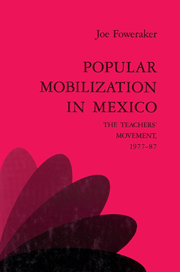Book contents
- Frontmatter
- Contents
- Preface
- Glossary of acronyms
- Introduction: The character and context of popular mobilization in contemporary Mexico
- PART I POPULAR MOVEMENT AND SYNDICAL STRUGGLE
- PART II INSIDE THE MOVEMENT IN CHIAPAS
- PART III NATIONAL MOBILIZATION AND SYSTEM RESPONSES
- PART IV POPULAR MOVEMENTS AND POLITICAL CHANGE
- 10 Institutional linkage
- 11 The political system
- 12 The political meaning of popular movements
- Bibliography
- Index
12 - The political meaning of popular movements
Published online by Cambridge University Press: 29 September 2009
- Frontmatter
- Contents
- Preface
- Glossary of acronyms
- Introduction: The character and context of popular mobilization in contemporary Mexico
- PART I POPULAR MOVEMENT AND SYNDICAL STRUGGLE
- PART II INSIDE THE MOVEMENT IN CHIAPAS
- PART III NATIONAL MOBILIZATION AND SYSTEM RESPONSES
- PART IV POPULAR MOVEMENTS AND POLITICAL CHANGE
- 10 Institutional linkage
- 11 The political system
- 12 The political meaning of popular movements
- Bibliography
- Index
Summary
The rise of popular movements in contemporary Mexico began with the students' movement of 1968 (see Introduction). Since that time these movements have grown and multiplied in every region and sector of the country, and have discovered new forms of political organization and new political strategies. Mexico is not unique in experiencing an upsurge in popular mobilization during this period; popular movements have also become increasingly important in Western Europe and North America, not to mention their impact on democratic struggles elsewhere in Latin America. The activities of the “new social movements,” as they are usually called in the literature, have generated a series of complex, and occasionally arcane, debates over the definition and significance of popular political organization, but these have often done more to confuse than to clarify our understanding of the phenomenon.
There is no intention here of reviewing this rather extensive literature, if only because this has already been done quite adequately elsewhere (Cohen 1985; Klandermans 1986; Tarrow 1986, 1988; Klandermans and Tarrow 1988). Nor is there any inclination to address the intricacies of the academic debates in all their gothic splendor. On the contrary, I wish to focus directly on the lessons of the teachers' movement in order to reach a practical understanding of popular movements and how they move. This will require a critical response to specific issues in the literature, without aspiring to an alternative explanation of “collective action” in general (après Tilly 1978 or Touraine 1988). In particular, the teachers' movement suggests different interpretations of the key questions of popular strategy and popular identity, which together indicate the need for a new analytical approach to popular mobilization.
- Type
- Chapter
- Information
- Popular Mobilization in MexicoThe Teachers' Movement 1977–87, pp. 171 - 186Publisher: Cambridge University PressPrint publication year: 1993



